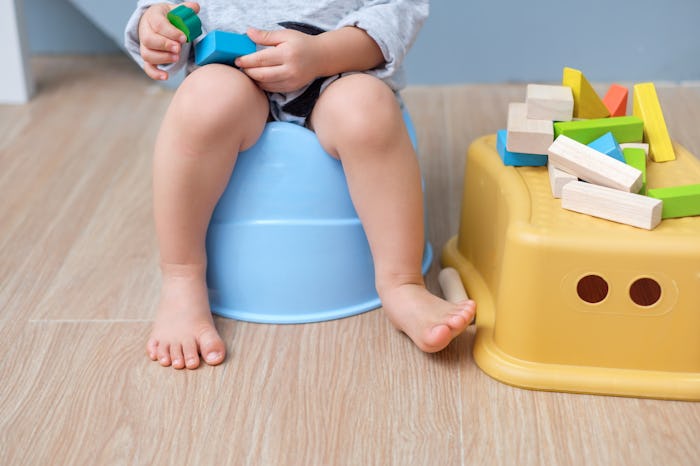Life
5 Parenting Habits That Increase Your Chances Of Successfully Potty-Training Your Child
From starting solids to learning to walk, every childhood milestone presents its own unique set of challenges — but this is especially true of potty training. Indeed, the very thought strikes fear into the heart of many a toddler parent, particularly because there's so much conflicting advice out there: Training pants or no training pants? Sticker chart or no sticker chart? Everybody's got an opinion, and they're all different (plus, kids are all different, too). Still, there are some tried-and-true parenting habits that can increase your chances of successfully potty training your child. So how can you modify your own behavior to make the process easier on the whole family?
The truth is, potty training doesn't have to be super stressful. So much of the process will depend on your own child's personality, and your willingness to go with the flow. And getting into bad habits early on is something you definitely want to avoid.
"Some habits parents adopt during potty training are helpful, others are less than helpful," Adriana Vermillion, a professional potty training instructor known as "The Potty Whisperer," tells Romper.
It's almost impossible to avoid some element of trial and error when you're training your little one. Yes, there will be accidents. There will probably be wet pajamas, and more than a few embarrassing moments in public when you can't find a bathroom in time. But sooner or later, the good news is that everybody learns how to use the potty. Here are some ways to make that happen sooner, rather than later.
1Be aware of fiber and water intake
Successful parents tend to become more aware of the family's diet during the training process, Vermillion says, often encouraging more water and fiber to prevent toddler constipation (a common potty training roadblock). Interestingly, she says, this is "a habit that tends to support the family long after potty training is done."
Makes sense: most of us could use more fluid and fiber in our diets!
But seriously, don't forget the fluid part of the equation: "Fiber without fluid makes cement," wrote Bryan Vartabedian, MD, a pediatric gastroenterologist at Texas Children's Hospital in his book Looking Out for Number Two: A Slightly Irreverent Guide to Poo, Gas, and Other Things That Come Out of Your Baby.
"And while fiber is important, fluid will get you further."
2Adjust your family's schedule as needed
Finding time to train can be especially tricky when there are older siblings in the family who are on busy schedules (as I myself am discovering at the moment with my youngest). But as Vermillion says, time and support are essential to the potty training child. So in ideal situations, she explains, "the family becomes more mindful by offering more time to the process rather than the normal hustle and bustle."
Easier said than done, of course. But if there's any way you can slow down the usual chaos during the training process, or at least make potty time a priority on par with soccer lessons or the family's other commitments, it could make all the difference. This is especially true in cases when you have a potty-training "deadline" (for preschool, daycare, etc.).
3Give your child lots of emotional support
While it's certainly not uncommon for parents to lose their patience while potty training, this kind of behavior from mom or dad can unfortunately lead to setbacks for kids.
"A child needs to feel emotionally safe to be able to to quiet the mind to properly eliminate," Vermillion explains.
In the most positive potty training situations, Vermillion says, parents realize that emotional support is key and tailor their own personal reactions accordingly. As hard as it can be to sit next to your kid on the potty reading story after story (or whatever else he needs you to do) when you're running late or know there are a million other things on your to-do list that need attention, remember that this phase won't last forever. In fact, the more support you give your child now, the faster and easier the process will likely be!
4Keep a journal
Before you even get started potty training, Vermillion recommends starting a journal for two weeks where you can jot down your child's natural patterns of elimination behavior: how often she goes, what time of day, and so on.
"Use the patterns to decide when it's a good time to start the training (morning or evening)," says Vermillion.
In other words, if you've got a kid who poops without fail within an hour or waking up, then morning is definitely a good time to initiate potty usage. If, on the other hand, your kid is an afternoon pooper, sitting her on the potty in the morning might not get you the intended results.
5Let your child lead
As you've no doubt learned as a parent already, kids will only make progress in a certain area when they're absolutely ready, which is why it's so important to pay attention to your child's cues and follow her lead (no matter what approach you take to potty training).
"Whatever path you take, take it slow, let the child lead and stick to the plan no matter what," says Vermillion.
Eventually, your kid really will be diaper-free. Really! It will happen! In the meantime, be patient with your child, the process (and yourself, too).
Check out Romper's new video series, Bearing The Motherload, where disagreeing parents from different sides of an issue sit down with a mediator and talk about how to support (and not judge) each other’s parenting perspectives. New episodes air Mondays on Facebook.
